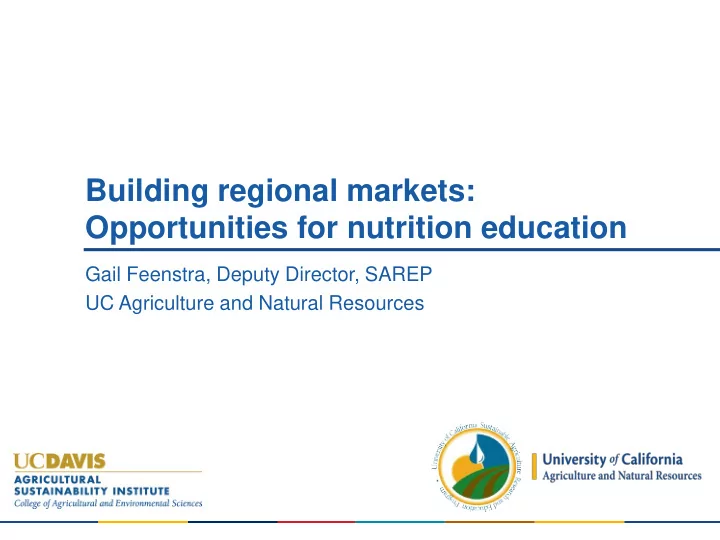

Building regional markets: Opportunities for nutrition education Gail Feenstra, Deputy Director, SAREP UC Agriculture and Natural Resources
SAREP’s Food & Society Program • Building regional markets and communities • Food system assessments and food policies • Farmworker and rural community well- being
Overview: Building Regional Markets • Farm to School/ Farm to institution • Urban Agriculture • Values-based supply chains How can these provide opportunities for direct nutrition education and policy/systems/environment approaches ?
Farm to School/ Institution • Local/regional food procurement • School gardens/ Farm tours • Recycling/ composting • Nutrition/ food education
Regional Food in Schools: Strategies • Introducing farm fresh food to students – Lunchroom/ salad bars/ lunch plates – Gardens • Cooking classes for food service • Marketplace exchange: connecting with farmers
Two Farm to School Tours • Tour attendees explore the benefits and challenges of Farm to School in California with a team of experts from across the state. • Visit innovative programs that support family farmers, healthy children, and thriving schools. • The tour focused on the impacts of Farm to School across California. • We discussed how policy and partnerships can expand impacts and overcome challenges.
Riverside Unified Farm to School Tour • Partnered with Urban & Environmental Policy Institute
Hot Lunch— Ranch cheese pizza ( Does the tennis ball count as fruit?) Dat a com pi piled d by by Jeri Ohm art , Melissa Salazar and Gail Feenst ra, UC SAREP Oct 2004
Color! Data compiled by Jeri Ohmart, Melissa Salazar and Gail Feenstra, UC SAREP Oct 2004
Sacramento Region Farm to School Tour
Professional Development for Food Service Staff
Davis Joint Unified School District & Davis Farm to School Dominic Machi Director Student Nutrition Services Professional development cooking classes
The team and their new, seasonal offerings
Marketplace Exchange: Connecting with farmers
Marketplace Exchange: November 2014 • Preparatory Work – Letter sent to 55 farmers from County Ag Commissioner – Registration included a questionnaire with info to create individualized profiles
Farmer/ Food Service Profiles Farmer Profiles Food Service Profiles • Basic contact info • Basic contact info • Crops grown, amounts in • Crops needed, amounts in each season each season • GAP, food safety certs, • Delivery needs, distributors liability insurance used, bid process
Marketplace Exchange • 38 participants – 16 farmers – 15 school buyers – 5 distributors – 2 other
Marketplace Exchange: Results Farmers 80% intend to sell to a school district or a distributor (73% to a school district, 33% to a distributor) 27% set up a sale to a school district or distributor (27% to a school district, 7% to a distributor)
Food Service Farm Tours
Outcomes • Local procurement increases in schools
Outcomes • Sales to regional farms increase
The Reward!
Opportunities for Direct Nutrition Education Key Takeaways • • Students/ Teachers – Classroom: cooking, tasting – Garden-based learning – Cafeteria (tastings): Harvest of the Month • Food Service staff: In-service trainings – Cooking classes/ demonstrations/ tastings – Farm or market tours • Farmers – Farm tours or farmers in classrooms
Opportunities for Policy/ Systems/ Environment • Involve policymakers, media • Gardens = nutrition + environment + experiential learning [food systems approach] • Farm to school provides many entry points for contributing to a more sustainable food system: – Appreciation for local ag, economic development – Seed to table cycle (students, food service, teachers, parents, community members) – Cultural, social, racial diversity
Keys to Success • Build relationships • Cross boundaries (and comfort zones) • Measure success; tell stories • Be patient • Empower people
Thank You! Gail Feenstra gwfeenstra@ucdavis.edu www.sarep.ucdavis.edu
Recommend
More recommend